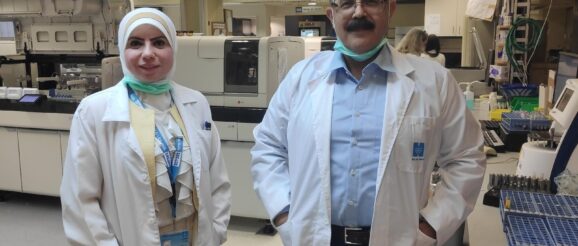Israeli Innovation, International Partnerships and Coronavirus: An Update

As AIJAC has previously reported (see here and here), Israel has responded to the coronavirus as it has responded to other past crises, with innovation.
While the current number of new cases in Israel continues to grow, and the second wave of the pandemic is not yet contained, the start-up nation has used its hi-tech nous to push for continuous improvement.
Thus, when , in collaboration with the UNAIDS Health Innovation Exchange, launched the COVID-19 Innovation Report which ranks the top performing countries in the fight against the virus, Israel came out second overall, behind the US. The algorithm used in the study takes into account the number of innovations as well as the potential impacts.
International Partnerships
Israel is not withholding its discoveries and newly developed technologies from the rest of the world. It is currently engaged in a number of partnerships around the globe.
Yoel Hareven, the director of the international division and resource development at Sheba Medical Centre- the largest hospital in Israel, said the hospital is working with Indonesian businesspeople who are interested in learning how to incorporate telemedicine and other Israeli medical innovations to fight the coronavirus.
Israel has developed lifesaving telemedical technologies such as the AI-based tele-ICU that uses artificial intelligence and machine learning models to predict respiratory disruptions. The analytics platform, CLEW-ICU, is currently being used at the Sheba Medical Centre and the Ichilov Hospital at Tel Aviv Sourasky Medical Centre. By predicting potential respiratory problems, healthcare workers are able to make early interventions that may alter clinical outcomes. Additionally, CLEW-ICU allows healthcare workers to monitor patients from a remote command centre which decreases the risk of exposure.
“We are mainly speaking about the technologies that we are using here at Sheba in Israel to protect our staff and not expose them to sick people,” said Hareven.
Israel and Indonesia, home to the world’s largest number of Muslims, have no formal diplomatic ties.
Israeli PM Binyamin Netanyahu also recently announced new private-public partnerships between Israel and the United Arab Emirates (UAE) to combat the virus. On July 2, an agreement was reached between Israel Aerospace Industries (IAI) and Abu Dhabi based technology company Group 42 (G42). A virtual agreement was also signed between G42 and Israeli defence technology company Rafael.
In a company statement, CEO of G42 Peng Xiao said, “At G42 we have always embraced international cooperation as a way to create better and more effective technologies for the public good. The UAE leadership has long advocated for a global collaborative effort to defeat the Covid-19 pandemic, and we are privileged to follow the lead and share our resources and expertise with Rafael and IAI for such a significant cause.”
The three companies will collaborate on research and development efforts to create solutions to combat the coronavirus. Israel also has no formal diplomatic ties with any of the Arab Gulf States, although unofficial relations have reportedly blossomed in recent years.
Israel’s corona cooperation also extends to South Asia. On July 26 a 20-person team of senior officials from Israel’s Directorate of Defense Research and Development (Hebrew abbreviation MAFAT) was supposed to depart to India to test a variety of COVID-19 technologies, but after a key member of the team was exposed to the coronavirus, the trip was postponed. The trip will be led by Israeli Ambassador to India Ron Malka and Military Attaché to India Col. Asaf Meller.
The trip is the result of several months of Israeli-Indian scientific cooperation.
The team is bringing technology used to detect the virus using soundwaves as well as machinery that can test patients for terahertz radiation, isothermic radiation, and polyamino acid. Israeli scientists believe that these four properties may offer early indicators of the coronavirus.
The Israeli corona team needs a large number of confirmed coronavirus patients to test the technology on, which would be very difficult to do in Israel, so are happy to make major progress in India. If successful, these tests could accurately detect coronavirus infections in a matter of minutes.
Additionally, the delegation will be bringing sanitisation equipment and ventilators.
The Indian government has enlisted the help of 100 healthcare professionals to assist the elite team of Israeli doctors and ministers with the testing and has commissioned the construction of numerous testing zones.
“The entire Defense Ministry is mobilized to fight the coronavirus,” said Defence Minister and alternative PM Benny Gantz. “We hope that the strenuous research and development led by MAFAT, together with our excellent academia and industries, will lead to a breakthrough that will change the way we diagnose and fight the virus.”
Israeli Innovations
Israel has developed numerous technologies and products to counter the pandemic in the months since AIJAC’s Ahron Shapiro and Naomi Levin wrote about how the start-up nation is using technology to fight the virus in April. Below is a list of some of the most promising innovations and discoveries by Israeli scientists, doctors, and entrepreneurs:
- Zebra Medical Vision: Artificial intelligence that provides accelerated and accurate medical image diagnosis to identify disease severity and enable doctors to provide the most effective care. The AI platform has already received five U.S. Federal Drug Administration clearances and has been named by Fast Company as one of the most innovative healthcare companies in 2020.
While Israel’s second wave of the coronavirus has surpassed the magnitude of the first wave, it’s still contributing to lifesaving innovations in the battle against the worldwide pandemic.
The post Israeli Innovation, International Partnerships and Coronavirus: An Update appeared first on AIJAC.
